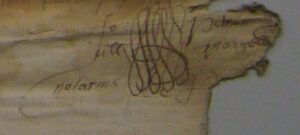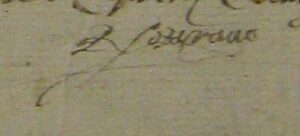Officials: Cotes, George
GEORGE COTES
First Marian bishop of Chester, 1554-1555
GEORGE COTES (COATES, COOTS, COTT), d. 1555
Qualifications: Bachelor of Arts 1522; Master of Arts 1526; Bachelor of Divinity 1534; Doctor of Divinity 1536.
CCEd person ID: 10308
Career: was elected a perpetual Fellow of Balliol in 1523 and a fellow of Magdalen in 1526 and later Master of Balliol in 1539. However, he was not popular with the fellows and was encouraged to resign in 1545. Between 1535 and 1549 he was presented to several rectories some of which he held in plurality and was presumably an absentee. By 1538 it had become apparent from a ‘sinister and seditious’ sermon which he preached at the Charterhouse of Sheen that he had not subscribed to the Oath of Succession, with its rejection of papal supremacy, so he was required to submit. It may have been this sermon which brought him to the attention of Henry Mann, prior of Sheen from 1535, who became dean of the new diocese of Chester in 1541 and may have been in a position to assist Cotes to the vacant fifth prebend at Chester in 1543.
Despite his unpopularity, Cotes was respected as a preacher and academic. His history of support for the old learning and opposition to the royal supremacy may have commended him to Queen Mary who appointed him as bishop of Chester following the deprivation of John Bird. He was consecrated in London on 1 April 1554.
He began a visitation of his new diocese in June 1554 and a surviving ordination book shows three ordination sessions in 1555, suggesting that he was attentive to his duties.
He did not, however, hold the post for long as he died in December 1555. He is remembered as the bishop who condemned George Marsh to be burned at the stake, the only Protestant known to have been executed in Chester diocese during the reign of Queen Mary.
Further notes: Cotes was from Yorkshire. He seems to have been a difficult and irascible man and is understood to have gained his election as Master of Balliol by a trick.
As at 14 January 2025 there is no entry for him in the Dictionary of National Biography (online edition).
Sources:
R. V. H. Burne, Chester Cathedral from its Founding by Henry VIII to the Accession of Queen Victoria (London: S.P.C.K., 1958), pp. 3, 18-19,
Rev. F. Sanders, ‘George Cotes, Bishop of Chester 1554-1555’, Journal of the Architectural, Archaeological and Historic Society for the County and City of Chester and North Wales, new series, 18 (1911), pp. 79-97
Cheshire Sheaf, 3rd series, ii, pp. 11-13
‘Colericke-Coverley’, in Alumni Oxonienses 1500-1714, ed. Joseph Foster( Oxford, 1891), British History Online https://www.british-history.ac.uk/alumni-oxon/1500-1714/pp304-337 [accessed 14 January 2025].
Joyce M Horn, David M Smith, Patrick Mussett, ‘Canons of Chester’, in Fasti Ecclesiae Anglicanae 1541-1857: Volume 11, Carlisle, Chester, Durham, Manchester, Ripon, and Sodor and Man Dioceses( London, 2004), British History Online https://www.british-history.ac.uk/fasti-ecclesiae/1541-1847/vol11/pp50-63 [accessed 14 January 2025]



